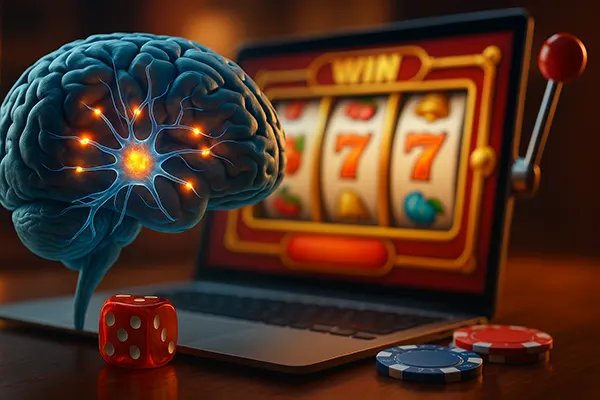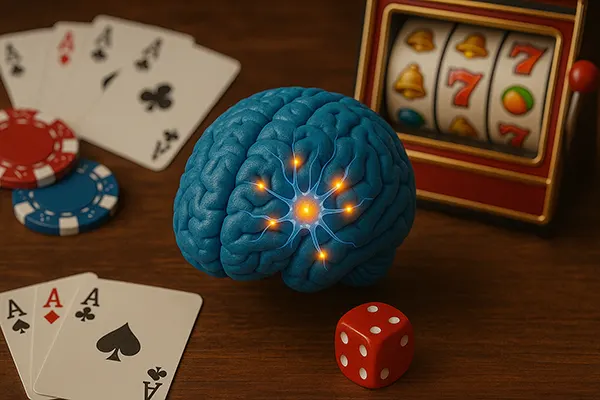The Psychology of Gambling: Understanding the Dopamine Loop in Online Games

Gambling addiction is not simply a matter of weak will or bad habits. At its core lies a powerful neurobiological mechanism — the dopamine loop. This feedback system deeply influences the reward system in the human brain and plays a central role in shaping behaviour during online gaming. As of February 2025, increased access to gambling games online and the precision of their design have made this loop even more potent and impactful. Let’s break down how this works and why it matters.
How Dopamine Fuels Gambling Behaviour
Dopamine is a neurotransmitter commonly associated with pleasure and reward. In gambling, however, it’s not the winning itself that triggers the biggest release — it’s the anticipation of a win. This is known as “reward prediction”. The brain learns to release dopamine in response to cues that predict a possible reward, such as spinning reels or a countdown to results.
Modern gambling games are designed to exploit this mechanism. Variable reward schedules — when the outcome is unpredictable and intermittent — are especially effective. They mirror the same techniques used in behavioural experiments on lab animals, which have shown compulsive pressing of levers for random rewards.
Crucially, dopamine does not only cause pleasure. It reinforces learning by helping the brain remember the conditions that led to the perceived reward. This means that even near-misses, which mimic real wins, can strengthen gambling behaviour through a similar dopamine response.
The Illusion of Control and False Patterns
Gamblers often believe they can influence outcomes or detect patterns in random events — a cognitive distortion known as the “illusion of control”. This is amplified in online settings, where game interfaces are designed to suggest a level of personal skill or influence.
Features such as interactive gameplay elements, animated reels, and congratulatory sounds reinforce this illusion. Even though the results are algorithmically generated and unaffected by user behaviour, the brain interprets them as part of a controllable system. This belief encourages repeated engagement and higher risk-taking.
Moreover, the human brain is inherently prone to seek patterns. Random sequences in gambling can appear non-random, leading players to think that wins or losses follow a meaningful trend — further reinforcing engagement through erroneous strategy development.
Psychological Hooks in Online Game Design
Game developers integrate a wide range of psychological hooks to maintain player attention. These include reward-based achievements, loyalty points, and time-limited challenges — all contributing to prolonged sessions and recurrent play. Unlike traditional gambling environments, online formats allow for precise tracking and customisation of stimuli.
Push notifications, pop-ups celebrating small wins, and progressive bonuses all work in tandem to keep the dopamine loop active. The integration of social features — such as leaderboards or friend challenges — further engages the brain’s reward system through social validation mechanisms.
Critically, these systems are always available. With mobile access and around-the-clock functionality, the opportunity to play is constant, reducing the natural barriers that might otherwise prevent compulsive behaviour. The dopamine loop has no real opportunity to reset, leading to increased intensity of conditioning.
Personalisation and Adaptive Difficulty
Many gambling sites now use AI-driven personalisation to tailor the experience to each user. Based on individual data, algorithms adjust the frequency and type of incentives shown, optimising them for maximum engagement and retention.
For example, a player who tends to quit after a losing streak might be offered a “comeback bonus” or free spins at precisely the right moment to re-engage them. These adaptive tactics are particularly effective because they react to emotional patterns in user behaviour.
Moreover, some platforms increase the difficulty curve subtly over time. As users progress, rewards become rarer but more emotionally valuable, mimicking a “grind” found in video games. This encourages commitment and the feeling that quitting would mean losing previous investments of time and effort.

The Consequences of Long-Term Dopamine Overload
Overstimulation of the dopamine system can have long-lasting effects. Research has shown that prolonged exposure to highly rewarding stimuli can dull the brain’s natural reward responses, leading to a condition known as “dopamine depletion”. This means that everyday pleasures become less enjoyable over time, while gambling retains its grip due to learned anticipation.
People caught in this loop often report anxiety, insomnia, and low mood when not playing — all symptoms associated with withdrawal. To relieve these states, the brain seeks the fastest path back to dopamine release, which reinforces continued gambling even in the face of financial or emotional loss.
As of early 2025, several health agencies across Europe have recognised this cycle as a serious public health issue. Intervention strategies increasingly include neurocognitive therapy, mindfulness-based relapse prevention, and stricter design regulations for online games to limit exploitative mechanisms.
Raising Awareness and Regulation
Understanding the dopamine loop is crucial for informed public health policies. Regulatory bodies are now pushing for more transparency in how game algorithms function and more control tools for users, such as time limits, spending caps, and self-exclusion options.
Educational campaigns targeting both young adults and older populations are being rolled out to improve awareness of how these systems work. Highlighting the science behind gambling addiction can empower users to recognise problematic behaviour early.
Furthermore, some countries are experimenting with mandatory “cooling-off periods” after extended gameplay. These measures are designed to disrupt the dopamine feedback cycle and allow users time to reflect, helping them make more rational decisions about continued play.
